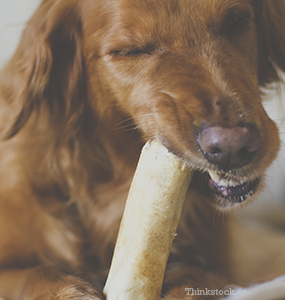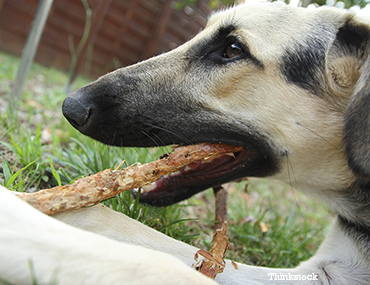Do you have a small dog that likes to wolf down treats or rawhides really quickly? If so, this blog is a must read!
Your dog’s throat
The esophagus is a thin sheet of muscle located within the thorax that connects the mouth with the stomach and aids in pushing food and water down into the stomach. Once in a while, if a dog (or rarely, a cat) swallows something too large – or too sharp – for it to pass out of the esophagus, it can become an esophageal foreign body. Esophageal foreign bodies typically get stuck in two locations in the esophagus: near the base of the heart or in the back (i.e., caudal) part near the diaphragm.
What might cause an esophageal foreign body in my dogs throat?
Common causes for esophageal foreign bodies include the following treats or objects:

- Rawhides
- Bones or bone fragments
- Fishing hooks
- Needles (especially stuck on a string)
Symptoms of an esophageal foreign body
Esophageal foreign bodies are a life-threatening type of obstruction and immediate veterinary attention is necessary. It’s important that you know what symptoms to look for in your pet when he is affected by an esophageal foreign body. The symptoms can be initially very exaggerated but then “go away” as your pet gets used to the feeling of something stuck in his throat. However, even though the clinical signs seem to resolve, the esophageal foreign body is actually causing severe silent injury to the tissues.
Symptoms of an esophageal foreign body include the following:
- Exaggerated swallowing motions
- Drooling
- Pawing at the mouth
- Pawing at the neck
- Inappetance/anorexia
- Acute frantic agitation
- Gagging
- Coughing
Problems caused by an esophageal foreign body
The longer the foreign body stays in the esophagus, the more pressure necrosis (i.e., cell death) it causes to the thin muscular wall of the esophagus. Untreated – or detected too late – an esophageal foreign body can result in severe complications, including inflammation of the esophagus (i.e., esophagitis), severe strictures (i.e., scarring of the esophagus), abnormal air entering the chest cavity (i.e., pneumothorax), or worse – perforation. When perforation occurs the esophagus ruptures resulting in bacteria entering the sterile chest cavity. Often times, this leads to sepsis (i.e., bacteria entering the blood stream) and death.

Studies have shown that these types of foreign bodies are more commonly seen in small breed dogs. Personally, I’ve seen this most commonly in West Highland white terriers and Yorkshire terriers. Dogs that are more “greedy” (e.g., who wolf down their treats or rawhide immediately) are potentially at greater risk of developing an esophageal foreign body. Studies have also shown that the longer the foreign body stays in the stomach and the longer the anesthesia times (meaning the longer esophageal foreign body is wedged into the esophagus), the worse the damage to the esophagus and the longer the hospital stay.
Diagnosing and treating an esophageal foreign antibody
The diagnosis of an esophageal foreign body is typically made on chest x-rays or even a barium swallow (which is when a large amount of dye is given through the mouth to highlight the esophagus). Thankfully, with rapid diagnosis the prognosis is excellent with treatment. Treatment includes anesthesia and endoscopy -- a small camera inserted into the mouth and esophagus. With endoscopy, the foreign body is often pulled out of the mouth or pushed directly into the stomach (where it can slowly digest or be removed with surgery). Surgery of the esophagus is not typically done due to poor healing of the esophagus and due to the invasiveness of the surgery (it requires the chest cavity to be opened up). Once the foreign body is removed, at home treatment includes antacids, stomach protectants, and canned food. In some circumstances, esophageal strictures can develop, requiring future endoscopy to balloon dilate the stricture.
Esophageal foreign bodies are an emergency that must be rapidly diagnosed and treated. Don’t miss the subtle nature of this life-threatening problem!
If you have any questions or concerns, you should always visit or call your veterinarian -- they are your best resource to ensure the health and well-being of your pets.
